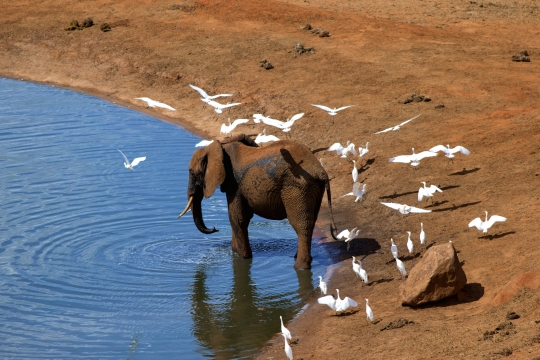Some rural communities in Zimbabwe are trying to get greater control of the income gained from hunting licenses, bypassing the regional government offices which have traditionally managed these revenues. And now, local economists want to understand if this is working to the benefit of the community, and if it’s enhancing their welfare.
‘One of the successful models for wildlife management in Zimbabwe is the CAMPFIRE project approach, where communities were given rights to manage wildlife in their regions,’ explains associate professor Edwin Muchapondwa, director of the University of Cape Town (UCT) School of Economics.
The CAMPFIRE projects - the ‘Communal Areas Management Programme for Indigenous Resources’ - were started in Zimbabwe the early 1980s, where communities were actively involved in wildlife management. The model, widely hailed as a success and later exported to neighbouring countries, allowed communities living in and around protected areas to both manage wildlife resources, and harvest them.
Villagers in these communities generally use wildlife as a source of food. But they might also find their crop and livestock practices clash with game needs. But this conservation approach allows communities to benefit from the tourist opportunities and revenues associated with having higher game counts in well-conserved wilderness areas.
Previously, the state’s rural district councils (RDCs) were appointed to handle wildlife rights, and manage the money generated by those rights, for instance through selling licences to trophy hunters.
‘Usually, the community is allocated a number of hunting licenses, for example for a certain number of elephants in a year. The RDC auctions those licences to middle men, mostly safari operators, who then travel abroad, where they will market and sell their licences to trophy hunters,’ Muchapondwa explains.
‘Previously, hunters would pay their money through the Reserve Bank. The RDCs would take a percentage of that, usually about 50%, and then distribute the rest to the community.’
With the financial crisis hitting Zimbabwe in the 2000s, and exchange control measures put in place, communities got to see less and less of this money trickling through. There may also have been a degree of corruption amongst RDC officials.
More recently, in order to regain this loss of income, and reclaim some power in this arrangement, some CAMPFIRE communities have sidestepped the RDCs and began negotiating directly with safari operators.
‘The communities are saying ‘the wildlife is ours, the licenses are ours, so the revenues should come directly to us’. In several cases, the RDCs aren’t able to counter this. This makes the communities more powerful than the RDCs.’
Muchapondwa and colleagues from the Environmental Policy Research Unit (EPRU), which is housed in the UCT School of Economics, want to see if this new approach is benefitting the communities’ welfare, compared with the previous system.
Some of the challenges the researchers face are difficulty of access to the more remote CAMPFIRE sites, and a lack of data due to patchy record keeping over time. However they have finally decided on two CAMPFIRE projects, which they will compare in their study. One is the Hurungwe project, and the other Mbire, one of which has the community reclaiming control of resources, while the other still has revenues handled by the RDC.
EPRU researchers have already done initial fieldwork, and hope to have their findings ready by 2016.
The EPRU is the regional centre of the Environment for Development (EfD) initiative.
For more stories about search around wildlife and community interactions and CAMPFIRE in Zimbabwe, click here.
